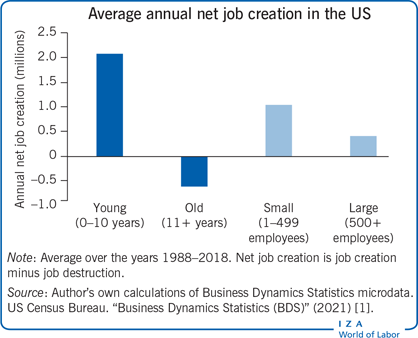Elevator pitch
Entrepreneurship is essential for a healthy labor market. Recent evidence shows that young businesses (at most ten years old) have, on average, accounted for all of US employment growth over the past few decades. New businesses are especially important for youth employment. However, these businesses tend to borrow a lot, and the credit constraints they face limit their ability to create jobs. Historically, much of the discussion regarding the economic importance of entrepreneurship has focused on small businesses. Empirical evidence increasingly suggests that, among small businesses, those that are young create the most jobs.
Key findings
Pros
Young businesses, on average, account for all recent US employment growth.
Start-ups are especially important for the employment of younger workers.
Non-employed workers are more likely to find a job at a young business.
A continuous supply of new jobs from start-ups is critical to keeping the unemployment rate low.
An increasing number of labor market statistics by firm age allows tracking of the contribution of start-ups to job creation and employment growth.
Cons
Young businesses provide their employees with less job security because of their relatively high exit rates, as well as their high rates of job turnover and churn.
Young businesses hire relatively few older workers.
Entrepreneurs rely on their own financial resources to start businesses; such businesses are often inefficiently small because of credit constraints.
There is a lack of data on entrepreneurs and their businesses in the years before they hire their first employee.
It is difficult to know how interventions may affect the number of new employer businesses.
